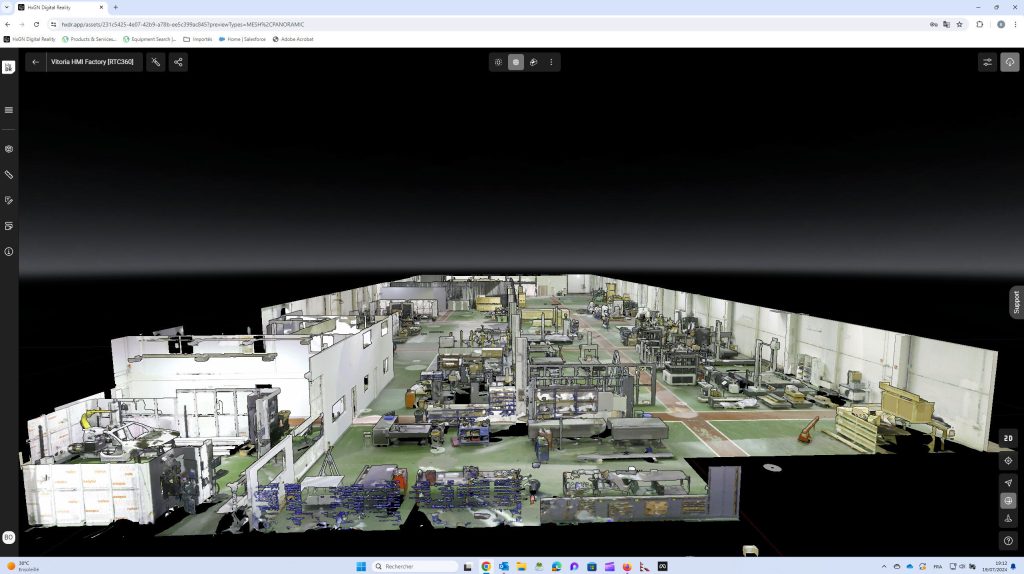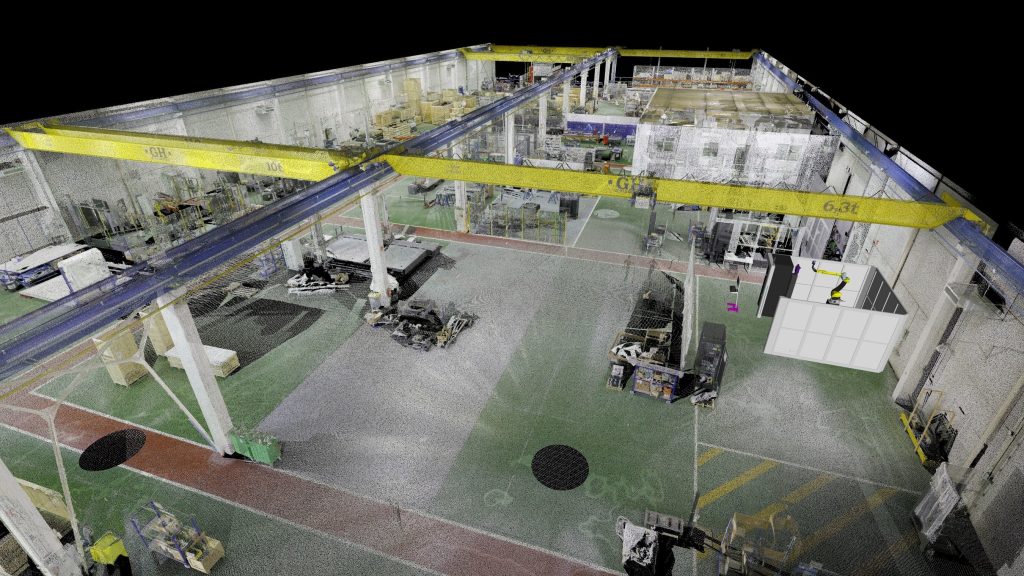Manufacturing technology company Hexagon has launched Digital Factory, a new digitalization solution designed to boost manufacturing productivity.
Unveiled at the Farnborough International Air Show 2024, Digital Factory was developed by Hexagon’s Manufacturing Intelligence division. It allows companies to create digital replicas of their factories, and add digital twins of machine hardware to a simulated shop floor.
According to Hexagon, this will enable manufacturers to optimize their floor plans, efficiently pivot production lines, and prepare for smarter and more sustainable future factories.
The Swedish firm believes Digital Factory could save global manufacturing companies £35 million per year by avoiding costly mistakes when planning and building factories. Digitizing the factory floor could also minimize on-site staff training requirements, reducing travel costs by 50%.
This targets growing demand from the manufacturing industry. According to Forrester and Hexagon’s Advanced Manufacturing Report, 32% of manufacturers believe existing manual workflows are impeding productivity and collaboration.
“Hexagon has developed a deep understanding of manufacturers’ needs. Digital Factory allows to bring the physical world into an accurate virtual sandbox of their factories on-demand,” commented Nicholas Lachaud Bandres, VP of Industry Solutions at Hexagon.
Bandres added that manufacturers can collaborate with their teams and suppliers to consider “what-if” scenarios and create more effective plant designs and layouts.

Hexagon launches Digital Factory
Digital Factory employs 3D metrology technology from Hexagon. This includes the company’s Leica BLK2GO handheld imaging laser scanner, Leica BLK ARC autonomous scanning module, and terrestrial laser scanners like the Leica RTC360. Using these 3D scanners with the Leica Cyclone software portfolio and Hexagon’s Reality Cloud Studio, manufacturers can create digital point cloud data of the factory floor.
Digital Factory is designed to integrate into existing customer workflows. It is compatible with Building Information Modelling (BIM) applications, Hexagon’s HxGN EAM asset management system, and popular CAD software including AutoCAD and Bentley.
Hexagon’s new solution allows users to conduct virtual tours for remote factory monitoring, removing the need for managers and contractors to travel to the site. Digital Factory can also be used for remote team collaboration by combining Hexagon’s cloud-based tools with live data. This allows factory planners and production managers to make decisions remotely.
According to Hexagon, Digital Factory can capture the precise measurements of a factory floor, creating a remotely accessible digital model that is accurate and reliable. As such, factory owners can monitor the progress of production lines, avoiding costs and disruptions associated with unexpected errors.
Manufacturers can also install and upgrade digital twins of equipment such as machining centres, 3D printers, robotics and metrology systems. Evaluating this in a risk-free digital model mitigates expensive mistakes such as ordering incorrect parts and having insufficient space for new hardware.
Additionally, Digital Factory allows users to test new machines, factory floor layouts and manufacturing workflows in a virtual 3D environment. This reportedly enables companies to quickly evaluate feasibility and emissions considerations when creating future-proof ‘smart factories.’

Digital twins enhance manufacturing
Digitalization software is nothing new, having been used for over two decades in civil infrastructure, architecture and public safety applications. In 2020, energy giant Royal Dutch Shell announced a four-year pilot project to trial digital twin technology at its Pulau Bukom refinery in Singapore.
The digital twin serves as a complete virtual representation of the refinery and its processes. 3D models will aid visualization, allowing each physical element of the site to be controlled remotely. According to initial plans, this technology is set to be fully implemented this year. It is expected to boost productivity while improving reliability and safety.
Shell has previously outlined future plans to deliver all live plant operation information to its engineers virtually through AR and VR. Next year, the company hopes to leverage tablets to perform all critical field operations at the Pulau Bukom refinery.
Swedish software company Interspectral offers digital twin functionality through its AM Explorer process monitoring and quality assurance platform. Designed to support metal 3D printing, the visualization software allows manufacturers to create multi-channel digital twins to duplicate and simulate live 3D printing operations.
Through AM Explorer, digital twins can be combined with virtual reality (VR) and augmented reality (AR) for more intuitive interaction with process simulation. In an interview at Formnext 2023, Interspectral’s CEO, Isabelle Hachette, pointed to an example of a digital twin being used for industrial turbine development. AM Explorer allowed engineers and designers to inspect the virtual turbine on a mobile phone through the cloud, saving time and money.
Want to help select the winners of the 2024 3D Printing Industry Awards? Join the Expert Committee today.
What does the future of 3D printing hold?
What near-term 3D printing trends have been highlighted by industry experts?
Subscribe to the 3D Printing Industry newsletter to keep up to date with the latest 3D printing news.
You can also follow us on Twitter, like our Facebook page, and subscribe to the 3D Printing Industry Youtube channel to access more exclusive content.
Featured image shows a digital replica of Hexagon’s automated solutions factory in Vittoria, made using Digital Factory. Image via Hexagon.


